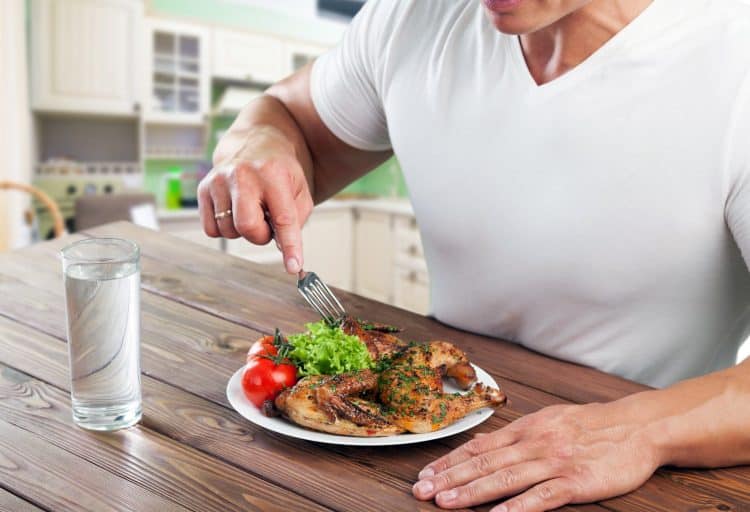Weight loss is hard. It requires pills, sauna belts, and crash dieting. We have been fed these lies for several decades.
Although it is true that most people never achieve their weight loss objective, it isn’t because it requires some magic formula. It is because most people make the same weight loss mistakes that disrupt their progress.
As a personal trainer with over seven years in the trenches, I’ve helped hundreds of people shed the spare tire.
On popular demand, I compiled the list of the 10 most popular weight mistakes everyone makes. Plus, I share the most effective ways to avoid these pitfalls and supercharge your fat loss journey.
Without further ado, here are the weight loss traps you must stay clear of:
Mistake #1: Not Setting Realistic Goals
The internet is filled with unrealistic fat loss advice. Many weight loss programs guarantee a weight loss of 20 pounds in just two weeks. Not only do unrealistic goals like these lead to frustration and disappointment, but they also increase the risk of contracting chronic health conditions.
According to the Centers for Disease Control and Prevention (CDC), you can safely lose 1 to 2 pounds weekly by cutting 500 to 1,000 calories from your diet daily (1). Anything over this makes you susceptible to health issues.
Unrealistic goals are arguably the biggest mistake why most people relinquish their weight loss ambitions before achieving their objectives.
According to the American Council on Exercise (ACE), you must set SMART goals you hope to achieve in the next six months to one year and beyond. Here is a lowdown on the SMART method: (2)
- Specific: Define exactly how much weight you want to lose.
- Measurable: Your goals must be tangible, and you must track your progress consistently.
- Achievable: The goals should be realistic and should fit your lifestyle.
- Relevant: Your goals must align with your overall health.
- Time-Bound: Set a specific deadline for your goals.
Sample SMART Goal: I’ll lose eight pounds of body weight in five weeks by consistently strength and cardio training four days per week and running a 1,000 daily calorie deficit.
Mistake #2: Skipping Breakfast
Many people skip breakfast to cut calories. This is also a premise of popular diet plans like 16:8 intermittent fasting.
However, breakfast has been touted as the most important meal of the day. Breakfast can fuel your metabolism and get it working in the top gear. When you skip breakfast, your body slows your metabolism, trying to save energy.
A high metabolic rate ensures you burn calories throughout the day.
Here are a couple of other side effects of a metabolic slowdown caused by eliminating breakfast:
- Mid-Morning Cravings: Around noon, your body starts screaming for quick energy fixes. These cravings are seldom healthy; think pastries or a bag of chips.
- Overeating at Lunch and Dinner: Many folks compensate for a missed breakfast by overindulging at lunch and dinner. However, you won’t be able to burn those extra calories effectively, credit to the sluggish metabolic rate.
Healthy Breakfast Ideas
Here are a few breakfast ideas for time-strapped individuals:
- Overnight oats
- Hard-boiled eggs
- Whey protein shake with milk
- Fruit and yogurt parfait
- Protein pancakes
You don’t need a fancy breakfast to lose weight. Focus on hitting your macro goals; the rest will take care of themselves.
Expert Opinion on Skipping Breakfast
In a YouTube video, Dr. Rhonda Patrick (Ph.D. in Biomedical Science) shared her thoughts on skipping breakfast and its effects on muscle tissue breakdown, which can hinder weight loss progress.
“I used to often skip breakfast myself. I now believe skipping breakfast can be detrimental to muscle health because it can lead to muscle breakdown. This is because when you don’t eat after a long night of fasting, your body doesn’t have the amino acids it needs to repair and rebuild muscle tissue.” — Dr. Rhonda Patrick
Mistake #3: Crash Dieting
Since most people want to lose weight quickly, the fitness world sees the introduction of new crash diets every few months.
Most of these diets have no scientific evidence to back their claims.
According to a study published in the Indian Journal of Medical Research, while reducing calorie intake is necessary, overly restrictive diets often lead to difficulty in maintaining weight loss. Gradual, sustainable changes to dietary habits are more likely to lead to long-term success. (3)
Here is why overly restrictive diets are a terrible idea for losing weight:
Reduced Metabolic Rate
Most fad diets work by restricting your calorie intake. This leads to a sharp decline in your metabolic rate to conserve energy. Simultaneously, your body tries to cling to the fat stores, which can lead to a condition known as ‘skinny fat.’
Lose Muscle
Make no mistake: restrictive diets can lead to weight loss. However, much of that weight comes from water and muscle mass. Losing muscle can be detrimental to your long-term health and fitness goals.
Unsustainable
Some fad diets will have you eating bananas, whereas others require you to live on cabbage soup. These diets are unsustainable in the long term. You must focus on making lifestyle changes to retain your progress.
Impacts Mental Health
Limiting your food choices can lead to cravings, constant hunger, and guilt trips. This increases the risk of developing eating disorders and an unhealthy relationship with food.
Fix Your Lifestyle
Here are the changes you must make instead of cutting your calories:
Enter a Calorie Deficit
Weight loss ultimately boils down to calories in versus calories out. Start with a small calorie deficit and increase it gradually as you get more comfortable. However, you shouldn’t cut more than 1,000 calories from your daily diet, as it can lead to nutritional deficiencies.
Prioritize Protein
When trying to lose weight, plan your meals with protein at the core. Protein boosts your metabolism, protects muscle mass, and keeps you satiated.
Eat More Fiber
Fiber enhances digestion and ensures your body absorbs most of the nutrients you eat. Fruits, veggies, and whole grains are packed with fiber and deliver long-lasting energy.
What People Who Have Lost Weight Say About Crash Dieting
I dove into Reddit forums to learn about the problems people face while losing weight on an overly restrictive diet. Here is what I found:
“There are multiple psychological factors to consider when dealing with weight loss, especially if you are starting from a very high weight. It is possible to develop an eating disorder through excessive calorie restriction.” — Koopzegels (r/loseit moderator who has lost 110 pounds)
Mistake #4: Not Getting Enough Protein
Protein is the building block of muscle. However, you also need protein if you want to shed weight. Here is how protein can help with fat loss:
Keeps You Satiated
Protein takes longer to digest than the other macronutrients (carbs and fats), which can help keep you full for longer. This reduces the risk of snacking on junk food at odd hours during the day. (4)
Builds Muscles and Boost Metabolism
Protein is the darling of bodybuilders and fitness enthusiasts for building muscle. Muscle mass is more metabolically active than fat mass, meaning if you have more muscles, you will burn more calories throughout the day than folks with more fat mass.
Best Protein Sources
Here are some of the most high-quality sources of protein:
- Lean meats
- Eggs
- Legumes
- Greek yogurt
- Protein powder
You must eat at least one high-protein food with each meal to speed up your weight loss journey.
Whey protein supplements are an excellent way to meet your daily protein requirements. However, you must not overly rely on protein powders. There is a reason why they are called ‘supplements.’
Use supplements only to plug the gaps in your diet.
Mistake #5: Relying on Cardio Only
Cardio is the most popular weight loss method. While LISS or HIIT cardio can help you get rid of the muffin top, it doesn’t work in isolation.
You must follow a balanced diet and strength training regime to achieve your dream physique. Since we have already covered diet in the previous point, let’s now focus on weight training for losing weight.
Here’s why lifting weights is as important as cardio to lose weight:
Muscle Boosts Metabolism
Muscle tissue burns more calories than fat mass at rest. Strength training is the most effective way of building muscle tissue. You must also prioritize high-protein foods to pack on muscle size.
The Afterburn Effect
Intense strength training sessions can lead to EPOC (Excess Post-Exercise Oxygen Consumption). EPOC enables your body to burn a heightened amount of calories hours after you finish exercising. This, combined with a high metabolic rate, makes strength training non-negotiable in a weight loss program.
Body Composition Changes
Too much cardio can lead to muscle and fat loss. Sticking solely to cardio might help you hit your weight loss target, but it doesn’t guarantee an aesthetically appealing physique. You probably don’t want to go from looking overweight to appearing weak.
How To Implement Strength Training in Your Workouts
Below is how you can implement strength training in your routine:
- Bodyweight workouts: Beginners can start by performing bodyweight training sessions three to four times weekly.
- Resistance bands: Once you have mastered the movement mechanics, incorporate bands into your training regime to make the exercises more challenging.
- Weight training: As you gain more experience, you can transition to lifting weights. Perform three to four sets of eight to 12 reps to promote hypertrophy. (5)
Mistake #6: Not Tracking Your Food Intake
Whether you want to lose weight, build muscle, or undergo a body recomp, you must familiarise yourself with calorie tracking.
A Journal of Diabetes Research study found that individuals who completed over 228 days of food logs to track their dietary intake (out of a possible 343) lost a significant amount of weight compared to those who tracked less than 228 days. (6)
Here are the benefits of calorie tracking:
Awareness
Tracking all your meals will give you a good idea of their calorie content. It will also help you familiarize yourself with the macro content of your favorite foods. Monitoring your calorie intake is essential to ensure you are in a calorie deficit.
Pro Tip: Get in the habit of reading food labels before buying any food item.
Eat Nutrient-Dense Foods
Eating ‘healthy’ isn’t the be-all and end-all. For instance, fruits and veggies are considered healthy. However, you cannot meet the ideal protein intake targets for building muscle by limiting yourself to these foods.
You must follow a balanced diet to ensure you hit your weight loss and muscle-building goals.
Small Bites Can Add Up
Many assume that eating a small, unhealthy snack during the day won’t hinder their progress. However, this couldn’t be farther from the truth. Mindless snacking, even a handful of nuts, can throw your fat loss ambitions for a spin.
I recommend my clients use a calorie-tracking app like MyFitnessPal or Lose It! to track their food intake. These apps have a vast database, allowing easy food logging.
Mistake #7: Not Getting Enough Sleep
Contrary to what most people think, you don’t lose weight while you’re running on the treadmill. You shed the excess weight while you’re sleeping.
You must aim for seven to eight hours of sleep each night to give your body enough time to rest and recuperate. Consistently skimping on sleep can lead to the following weight loss issues:
- Hormone Imbalance: Sleep deprivation can negatively affect ghrelin and leptin production. It can also hamper the growth hormone and testosterone levels.
- Slow Metabolism: A lack of sleep disrupts your body’s ability to process insulin correctly, which can slow your metabolism and make you store more body fat.
- Low Energy Levels: Running on low sleep can make you feel lazy throughout the day and hamper your productivity. It also increases your chances of reaching out for unhealthy foods to satisfy your cravings.
A lack of sleep is one of the biggest weight loss mistakes everyone makes.
You must follow a consistent sleeping schedule to ensure you’re getting ample sleep. Adopt a winding-down routine to fall asleep faster.
Mistake #8: Mindlessly Snacking
Mindless snacking is among the biggest reasons behind weight gain. You must learn to differentiate between true hunger signals and cravings to ensure you stay on track with your weight loss efforts.
Before you reach out for your favorite snack, ask yourself if you’re truly hungry or if you are eating out of boredom. Have a glass of water whenever you’re craving for a snack. Finally, don’t stock your pantry with unhealthy snacks. It significantly lowers the risk of eating unhealthy foods.
Mistake #9: Underestimating Portion Sizes
Restaurant meals and oversized plates can warp your understanding of what a true potion looks like. It increases the risk of overeating and entering a calorie surplus.
Beginners must weigh their food to ensure they are staying within their calorie targets. When eating out, ask the restaurant staff about the portion sizes.
Plus, you must learn to listen to your body. Eat only until you are about 80 percent full. You don’t have to feel stuffed before you stop eating. Mindful eating, which involves avoiding distractions while eating, makes it easier to listen to the fullness cues.
Pro Tip: Keep a weighing scale on your kitchen top to take the guesswork out of portion control.
Mistake #10: Drinking Your Calories
Sugar-laden sodas, coffees, and packaged juices can disrupt your weight loss journey.
Furthermore, these beverages contain empty calories, meaning they have no nutrient content and will be deposited in your body as fat. Whenever you are craving a beverage, make sure you opt for a sugar-free variant.
That said, plain water is the only beverage you need.
Water is calorie-free and vital for sustaining bodily functions. Most individuals should drink a gallon of water daily. You could also include unsweetened teas and coffees in your diet if you cannot imagine your day without caffeine.
Note: The content on Fitness Volt is for informative purposes only. Do not take it as medical advice to diagnose, prevent, or treat health problems. If you’re suffering from a health issue, are pregnant, or are under 18 years old, you should consult your physician before starting any new supplement, nutrition, or fitness routine.
Conclusion — Weight Loss Mistakes Everyone Makes
Skipping breakfast, not getting enough protein, and crash dieting are some of the most common weight loss mistakes everyone makes. Focus on balanced eating, consistent exercise, and tracking your progress to fast-track your fat loss journey.
Losing weight initially can feel overwhelming. However, staying consistent with healthy lifestyle choices and avoiding these 10 weight-loss mistakes will ensure that the weighing scale’s needle budges in the right direction.
If you have any questions about weight loss mistakes, drop them in the comments below, and I’ll be happy to help!
References
Fitness Volt is committed to providing our readers with science-based information. We use only credible and peer-reviewed sources to support the information we share in our articles.
- Centers for Disease Control and Prevention (CDC). (2024, March 15). Losing Weight. Retrieved from
- American Council on Exercise (ACE). (2017, February 14). Smart Goal Setting Process | Create a Goal the SMART Way (SNIPPET). Retrieved March 27, 2024, from ACE Fitness: Nicole Thompson%20on%20February 14
- Joshi S, Mohan V. Pros & cons of some popular extreme weight-loss diets. Indian J Med Res. 2018;148(5):642-647. doi:10.4103/ijmr.IJMR_1793_18
- Paddon-Jones, D., Westman, E., Mattes, R. D., Wolfe, R. R., Astrup, A., & Westerterp-Plantenga, M. (2008). Protein, weight management, and satiety. The American journal of clinical nutrition, 87(5), 1558S–1561S.
- Schoenfeld BJ, Grgic J, Van Every DW, Plotkin DL. Loading Recommendations for Muscle Strength, Hypertrophy, and Local Endurance: A Re-Examination of the Repetition Continuum. Sports (Basel). 2021;9(2):32. Published 2021 Feb 22. doi:10.3390/sports9020032
- Ingels JS, Misra R, Stewart J, Lucke-Wold B, Shawley-Brzoska S. The Effect of Adherence to Dietary Tracking on Weight Loss: Using HLM to Model Weight Loss over Time. J Diabetes Res. 2017;2017:6951495. doi:10.1155/2017/6951495
منبع: https://fitnessvolt.com/weight-loss-mistakes/




